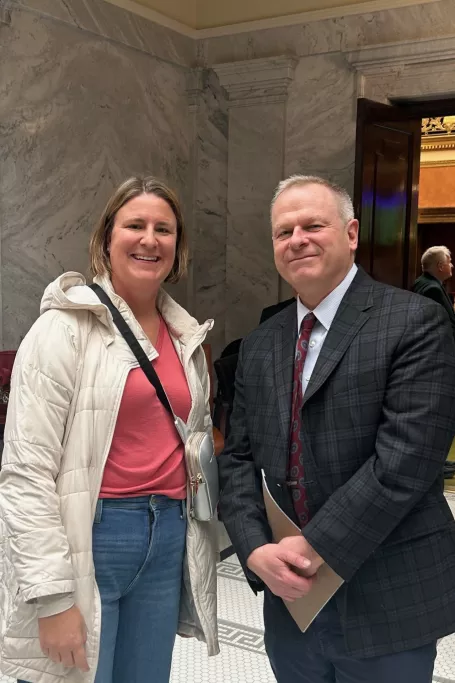My time as a Policy Ambassador was both new and unknown. I have gained substantial knowledge about the politics of education. As many teachers are aware, education is intertwined with politics. We, as educators, sometimes feel that being part of the political process can be overwhelming, and we don't know where to start or how to help. The UEA does an excellent job of keeping educators informed and up-to-date on the most impactful bills but learning to stay connected with matters important to us as educators can be challenging.
My favorite part of being a Policy Ambassador, including my Educator Day on the Hill, was learning how it all works. It all started when we first met in the fall, where we were educated on how education is funded, how bills are created, the process bills go through, and other committees. It was incredibly helpful to learn about resources for keeping track of upcoming bills that would be considered in this legislative session. In January, once bills started appearing, I would spend 15-20 minutes a day just scrolling and seeing what was up for discussion. I began educating myself on which bills seemed beneficial to my students and to me as an educator. At one point, we got to meet with our Superintendent and discuss some of those bills and which ones benefited our district. It was very informative to understand the district's needs what I needed as a teacher, and whether we could align our educational values. After becoming educated, I felt more comfortable taking a stance on a bill or topic and began emailing and texting my representatives. It was straightforward, and we would email or text and have conversations about educational bills and what was important for the classroom and educators they wanted to know. I started to realize that they really didn't know what it was like to be a teacher. They didn't understand my daily grind.
As time went on, I would talk to staff at lunch and breaks and ask them if they had heard about bills that were up for discussion. Many teachers were unaware of what was being discussed in the legislative session. I enjoyed educating them about bills, their importance, and how easy it was just to send a text or an email expressing their opinions. I would talk about the different resources they could use to track bills and that it could just be for a few minutes a day. I tried to encourage them to contact their representatives.
My day on the Hill was another day of learning the ropes. Teachers who had been there before were very helpful and willing to show me the ropes. We were given tools to contact different representatives while we were at the Capitol and could set up meetings with them about our important issues. I was able to meet with two representatives that day. They were both so different, and it was interesting to hear their perspectives on education. One had a mother who was a teacher, and in chatting, we learned that his mother had worked at one of my schools at one point in time. We had something in common, and it was easier to discuss why certain bills would help or hurt education. Because we had something in common, it was easy to ask for a certain vote of yes or no. My second meeting was with a Senator, and his knowledge of the classroom was much different. He wasn't as knowledgeable about education and didn't understand classroom needs. He was very willing to talk and listen and asked how I felt about certain issues and what type of vote I felt was needed on certain issues.
At the end of my time as a Policy Ambassador, I realized that educating everyone on both ends is the most important aspect of the legislative session. Legislators need education on classrooms and the wants and needs of teachers. Teachers need education on educational politics, how to support politics, and not to be overwhelmed. I loved talking to my colleagues about bills and encouraging them to send an email, invite legislators to classrooms, and help educate more. I enjoyed contacting representatives and helping them understand the needs of educators. Even if I educated one person, I felt like I had helped someone who, hopefully, would educate someone else. It's the power of education at its finest.
